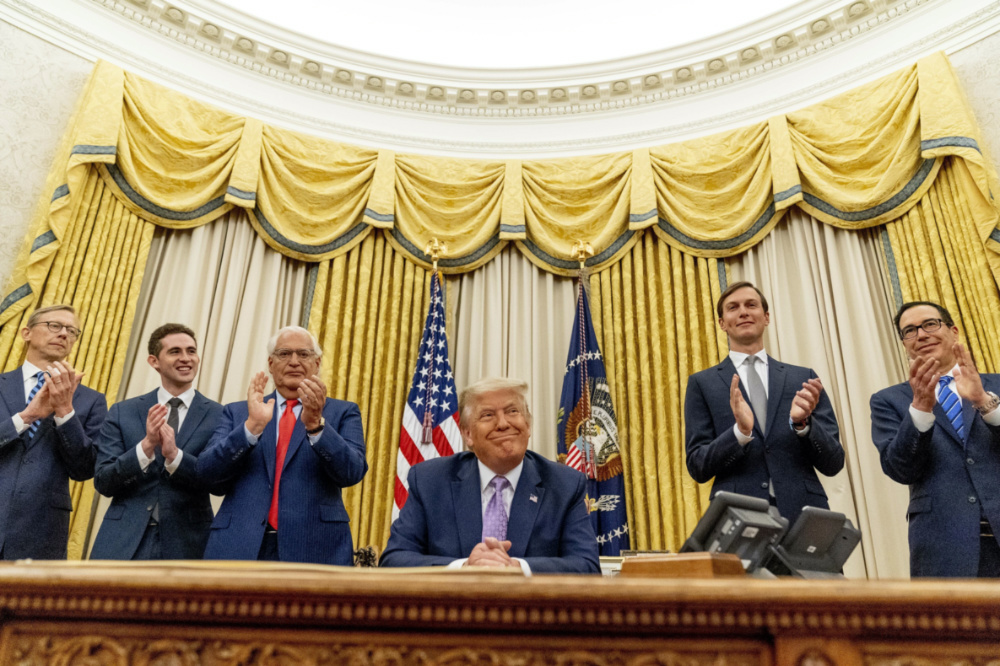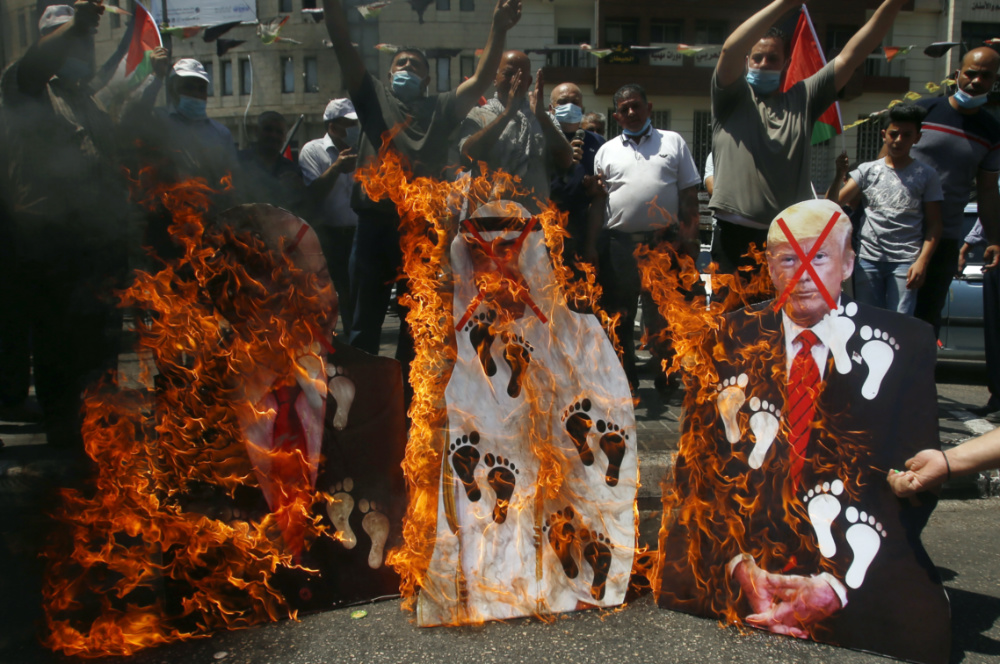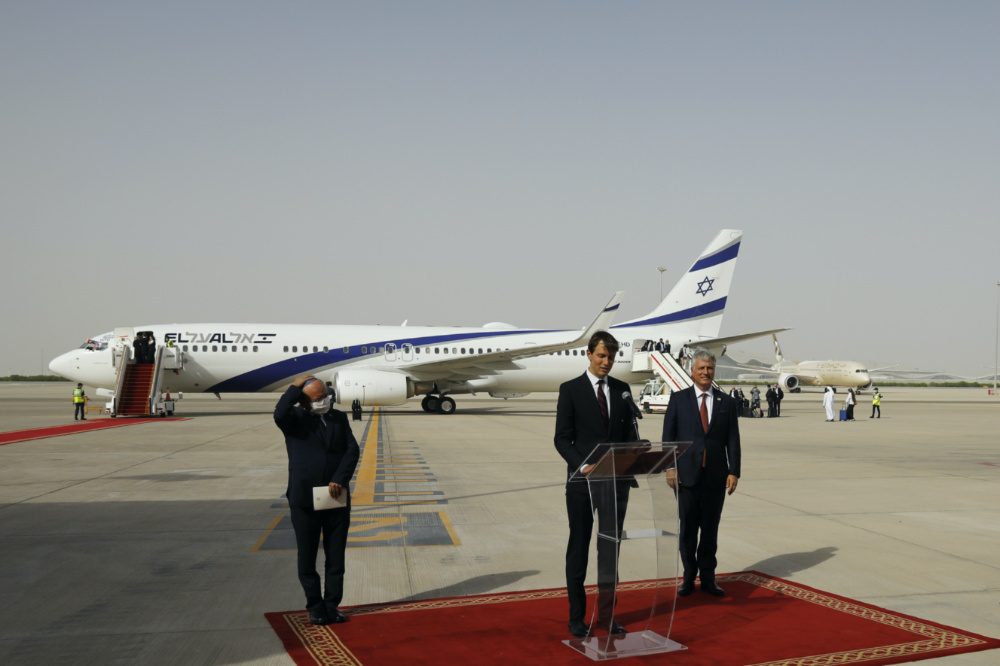Jerusalem, Israel
AP
For the first time in more than a quarter-century, a US President will host a signing ceremony between Israelis and Arabs at the White House, billing it as an “historic breakthrough” in a region long known for its stubborn conflicts.
But while the optics of Tuesday’s event will evoke the groundbreaking agreements that ended decades of war between Israel and neighbouring Egypt and Jordan, and that launched the peace process with the Palestinians, the reality is quite different.
The United Arab Emirates will establish diplomatic relations with Israel, a fellow US ally it has never gone to war with, formalising ties that go back several years. The agreement cements an informal alliance against Iran and could pave the way for the UAE to acquire advanced US weapons, while leaving the far more contentious Israeli-Palestinian conflict as intractable as ever.

In this 12th August file photo, President Donald Trump, accompanied by, from left, US special envoy for Iran Brian Hook, Avraham Berkowitz, Assistant to the President and Special Representative for International Negotiations, US Ambassador to Israel David Friedman, President Donald Trump’s White House senior adviser Jared Kushner, and Treasury Secretary Steven Mnuchin, smiles in the Oval Office at the White House in Washington. For the first time in more than a quarter-century, a US President will host a signing ceremony, on Tuesday, 15th September, between Israelis and Arabs at the White House, billing it as an “historic breakthrough” in a region long known for its stubborn conflicts. PICTURE: AP Photo/Andrew Harnik/File photo.
That hasn’t stopped President Donald Trump from referring to the UAE deal, which was announced last month, as heralding a “previously unthinkable regional transformation.”
A similar agreement announced Friday with Bahrain, which welcomed a visiting Israeli Cabinet minister as early as 1994, also formalises longstanding ties.
The agreement with Bahrain has raised the possibility that Saudi Arabia – the ultimate prize in Israel’s normalization drive – could follow suit. Bahrain’s Sunni monarchy is closely allied with Saudi Arabia, which helped quash a popular uprising among the island nation’s Shiite majority in 2011. Saudi Arabia has quietly acquiesced to the UAE deal, opening its airspace to commercial flights between Israel and the Emirates.
But it’s debatable whether agreements like these, among already friendly countries, do much to advance regional peace.
The region’s main conflict pits Israel and the Gulf Arab countries against Iran and its proxies. In the long term, many believe the biggest threat to Israel’s survival as a Jewish-majority and democratic state is the conflict with the Palestinians, who may soon outnumber Jews in the territory between the Mediterranean Sea and the Jordan River.
The Trump administration hopes that as more Arab countries normalise ties with Israel, it will pressure the Palestinians to return to peace negotiations, which ground to a halt more than a decade ago.
Over the last three years, Trump has cut off aid to the Palestinians, recognized contested Jerusalem as Israel’s capital, dropped the longstanding US opposition to Israeli settlements and released a Mideast plan that overwhelmingly favours Israel.
The breakdown of the longstanding Arab consensus that recognition only be granted in return for territorial concessions has meanwhile left the Palestinians arguably more weak, isolated and demoralised than at any point in their history.
But rather than cowing Palestinian leaders into submission, those moves have only made them more defiant. President Mahmoud Abbas officially cut all ties to Israel and the US in May and said the Palestinians would no longer be bound by any past agreements. The Palestinians have rejected the UAE and Bahrain deals as a betrayal of their cause and insist no other country has the right to negotiate on their behalf.
“Normalisation of states in the region with Israel will not change the essence of this conflict, which is the systemic denial of the Palestinian people’s inalienable right to freedom and sovereignty,” said Hanan Ashrawi, a senior Palestinian official.

In this 14th August, 2020, file photo, Palestinians burn pictures of US President Donald Trump, Abu Dhabi Crown Prince Mohammed bin Zayed al-Nahyan and and Israeli Prime Minister Benjamin Netanyahu during a protest against the United Arab Emirates’ deal with Israel, in the West Bank city of Nablus. PICTURE: AP Photo/Majdi Mohammed/File photo.
Daniel Shapiro, who served as US Ambassador to Israel during the Obama administration, said normalisation is a positive step that could potentially improve the prospects for peace.
“If it’s used effectively it can be a basis for a renewed effort to generate momentum for two states,” said Shapiro, who is now a visiting fellow at Israel’s Institute for National Security Studies. “But it has to be led by a US administration that is committed to a two-state solution, and that’s very different from the Trump plan.”
Aaron David Miller, a veteran American peace negotiator, said anyone hoping to resolve the Israeli-Palestinian conflict “would not have behaved the way this administration has behaved for the last four years.”
“I don’t think this is going to make it any easier or in real time bring us any closer to serious negotiations, but I would have argued that before the UAE-Israel deal,” said Miller, who is now at the Carnegie Endowment for International Peace.
While Trump’s approach has pushed the Palestinians into a corner, it has also vindicated Israeli Prime Minister Benjamin Netanyahu’s long-standing belief that his country can secure its future and avoid international isolation without making any concessions to the Palestinians.
For more than three decades, the Palestinians have sought an independent state in east Jerusalem, the West Bank and the Gaza Strip, territories seized by Israel in the 1967 war with Arab states. Israel withdrew from Gaza in 2005 but imposed a blockade after the militant group Hamas seized power two years later.
The Trump plan would allow Israel to annex up to 30 per cent of the occupied West Bank, including all of its far-flung Jewish settlements. The Palestinians would be left with scattered enclaves surrounded by Israel, which would have overall security control. Netanyahu pointedly refers to it as an entity “that President Trump defines as a state.”
The UAE said its agreement with Israel took annexation off the table, but Netanyahu has said the pause is temporary and that Israel remains committed to the Trump plan.
The plan “does not describe a Palestinian state with even a modicum of sovereignty,” Shapiro said. “Fortunately the UAE deal resulted in annexation being taken off the table. Now it’s time to shelve other aspects of the Trump plan.”
Former Vice President Joe Biden has promised a more even-handed approach if he is elected in November. He is opposed to annexation and would almost certainly scrap the Trump plan.
Trump’s re-election would bring even more pressure to bear on the Palestinians, potentially leading them to abandon the two-state solution altogether and demand equal rights in a single binational state.

In this 31st August file photo, US President Donald Trump’s senior adviser Jared Kushner, centre, speaks as Israeli National Security Advisor Meir Ben-Shabbat, left, and US National Security Advisor Robert O’Brien stand by after an El Al plane from Israel landed in Abu Dhabi, United Arab Emirates. PICTURE: Nir Elias/Pool Photo via AP/File photo.
The current Palestinian leadership is opposed to such an outcome, as are the vast majority of Israelis and Palestinians, but that could change if Trump and Netanyahu succeed in extinguishing Palestinian hopes for statehood.
“The assumption is that the Palestinians have no choice but to accept it,” said Hugh Lovatt, a policy fellow at the European Council on Foreign Relations.
“But actually, the Palestinians do have another choice, which is actually to pivot toward calling for equal rights within one state” he said. “That’s the fundamental weakness and flaw in the Trump vision, is that it misunderstands a lot of these long-term dynamics.”





